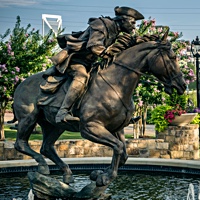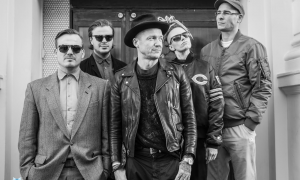Home » Jazz Articles » Live Review » Chris Brubeck at the Bechtler Museum of Modern Art
Chris Brubeck at the Bechtler Museum of Modern Art
Bechtler Museum of Modern Art
Jazz at the Bechtler
Charlotte, NC
October 4, 2019
The "Jazz at the Bechtler" series celebrates its tenth anniversary this year, and next year is composer/pianist Dave Brubeck's centenary. So it is appropriate that Dave's son Chris was the special guest for a pair of concerts with the Ziad Jazz Quartet. Chris spent several years playing with his dad's group, and has established himself as a composer/trombonist/bassist/pianist in his own right. He has composed orchestral pieces (often featuring his trombone playing), as well as playing in several groups, often with his brothers.
The concert began without Brubeck, led by saxophonist Ziad Rabie on tenor saxophone (the instrument he played most of the time). He was joined by pianist Noel Freidline, double bassist Ron Brendle, and drummer Al Sergel. After introducing the band, Ziad mentioned that the series had honored Dave Brubeck twice in the past: in 2012, then again in 2015 (which had featured sculptor Peter Rubino—who specializes in making clay sculptures in front of an audience—making one of Dave Brubeck while the band played his music). Ziad related a personal story, about opening for Dave Brubeck's band in Charlotte at age 23.
Chris Brubeck joined the band to play Dave Brubeck's "Blues For Newport." After a string of strong solos from trombone, saxophone, piano and double bass, the whole band traded fours with the drums. Brubeck told the story of the creation of the tune. His dad was playing at the Newport Jazz Festival, and was told that his record label had a mobile recording truck there, hoping to record new original music. Brubeck asked how long he had before going on stage. In six minutes he composed the piece. Brubeck also talked about the universality of the blues, relating an experience with musicians in Russia who did not speak English, but did speak the blues.
Dave Brubeck's "In Your Own Sweet Way" has become a standard. Trumpeter Miles Davis was at a Brubeck show in St. Louis, and asked the composer for a chart so he could record the tune. Brubeck quickly wrote one out, but it was hard to read. So Davis had trouble reading one of the notes in the melody, and played a single wrong note. His version is so well known that everyone assumes his version is correct. Chris joked that as a trombonist he could slide into the note, playing both versions. Pianist Friedline and Brubeck each referred to both note possibilities, and the performance included a rhapsodic piano solo as well as a lyrical double bass solo.
The Dave Brubeck Quartet's milestone album Time Out (Columbia, 1959) is now sixty years old. The first piece played from it was "Three To Get Ready," an experiment in meter that uses alternating bars of 3/4 and 4/4. Lots of group interplay on it, with a round of brief solos filling in the gaps in the head. Brubeck said that his mom Iola was a talented lyricist (but we would all be glad that he would not be singing her lyrics). She wrote the lyrics for "My One Bad Habit is Falling in Love," which has the distinction of being titled for something singer Ella Fitzgerald said to Dave Brubeck when they both performed at a very poorly organized festival. Next the group played a less commonly heard Dave Brubeck composition. "Forty Days" (a reference to Jesus' period of fasting in the desert) comes from the oratorio The Light in the Wilderness: An Oratorio for Today, which Brubeck wrote in gratitude for surviving a battle in World War II. Ziad switched to soprano saxophone, an appropriate choice for the exploratory, serpentine flow of the piece.
At this point Brubeck switched to fretless electric bass guitar—an instrument he often plays in his own groups—turning the group into a quartet. He wrote "Bullwinkle's Revenge" for the Brubeck Brothers band. Its fast bebop and hooky solo form suited the whole band, but it especially featured the bass solo and Sergel's inspired drumming over a repeated riff to end the tune. Ziad announced Dave Brubeck's "Cassandra" as a "blazing tune," and it was indeed even faster bebop than the previous piece. It again featured Sergel, this time trading eights with the rest of the band.
Brubeck welcomed back "the real bassist" for Dave Brubeck's signature "Take Five," the tune that introduced 5/4 time to a broad audience. This audience recognized it almost immediately, even before the the theme was played. A drum solo has always been part of the arrangement, and Sergel began his by coaching the crowd to clap on 5 before launching into his solo. Brubeck plays piano, too, and took over the piano bench for the famous "Blue Rondo a la Turk." Its 9/8 rhythm was taken from Turkish music that Dave Brubeck heard during the famous State Department-sponsored jazz tour that first took him overseas. The "blue" part of the title comes from the swing sections in standard 4/4 time. After the theme Brubeck switched back to trombone. Friedline's quote from the musical West Side Story during his solo was echoed by Brubeck during his trombone solo. And the concert closed with the trombone doubling the piano on the theme.
An exciting ending to a terrific concert. Brubeck is truly an artist who enjoys his work. His enthusiasm and joy in playing were contagious, and were clearly shared by his new Charlotte band-mates.
Tags
Live Reviews
Chris Brubeck
Mark Sullivan
United States
North Carolina
Charlotte
Dave Brubeck
Ziad Rabie
Ron Brendle
Al Sergel
Miles Davis
Ella Fitzgerald
Noel Freidline
PREVIOUS / NEXT
Support All About Jazz
 All About Jazz has been a pillar of jazz since 1995, championing it as an art form and, more importantly, supporting the musicians who make it. Our enduring commitment has made "AAJ" one of the most culturally important websites of its kind, read by hundreds of thousands of fans, musicians and industry figures every month.
All About Jazz has been a pillar of jazz since 1995, championing it as an art form and, more importantly, supporting the musicians who make it. Our enduring commitment has made "AAJ" one of the most culturally important websites of its kind, read by hundreds of thousands of fans, musicians and industry figures every month.






























